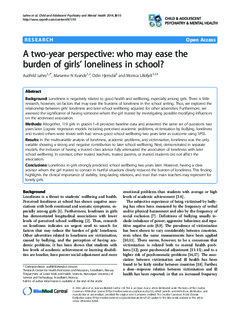| dc.contributor.author | Løhre, Audhild | |
| dc.contributor.author | Kvande, Marianne Nilsen | |
| dc.contributor.author | Hjemdal, Odin | |
| dc.contributor.author | Lillefjell, Monica | |
| dc.date.accessioned | 2015-01-06T08:21:11Z | |
| dc.date.accessioned | 2016-04-20T13:59:51Z | |
| dc.date.available | 2015-01-06T08:21:11Z | |
| dc.date.available | 2016-04-20T13:59:51Z | |
| dc.date.issued | 2014 | |
| dc.identifier.citation | Child and Adolescent Psychiatry and Mental Health 2014, 8(10) | nb_NO |
| dc.identifier.issn | 1753-2000 | |
| dc.identifier.uri | http://hdl.handle.net/11250/2386561 | |
| dc.description.abstract | Background:
Loneliness is negatively related to good health and wellbeing, especially among girls. There is little research, however, on factors that may ease the burdens of loneliness in the school setting. Thus, we explored the relationship between girls’ loneliness and later school wellbeing adjusted for other adversities. Furthermore, we assessed the significance of having someone whom the girl trusted by investigating possible modifying influences on the addressed association.
Methods:
Altogether, 119 girls in grades 1–8 provided baseline data and answered the same set of questions two years later. Logistic regression models including perceived academic problems, victimisation by bullying, loneliness and trusted others were tested with bad versus good school wellbeing two years later as outcome using SPSS.
Results:
In the multivariable analysis of loneliness, academic problems, and victimisation, loneliness was the only variable showing a strong and negative contribution to later school wellbeing. Next, demonstrated in separate models; the inclusion of having a trusted class advisor fully attenuated the association of loneliness with later school wellbeing. In contrast, other trusted teachers, trusted parents, or trusted students did not affect the association.
Conclusions:
Loneliness in girls strongly predicted school wellbeing two years later. However, having a class advisor whom the girl trusted to contact in hurtful situations clearly reduced the burden of loneliness. This finding highlights the clinical importance of stability, long-lasting relations, and trust that main teachers may represent for lonely girls. | nb_NO |
| dc.language.iso | eng | nb_NO |
| dc.publisher | BioMed Central | nb_NO |
| dc.rights | Navngivelse 3.0 Norge | * |
| dc.rights.uri | http://creativecommons.org/licenses/by/3.0/no/ | * |
| dc.title | A two-year perspective: Who may ease the burden of girls' loneliness in school? | nb_NO |
| dc.type | Journal article | nb_NO |
| dc.type | Peer reviewed | nb_NO |
| dc.date.updated | 2015-01-06T08:21:11Z | |
| dc.source.volume | 8 | nb_NO |
| dc.source.journal | Child and Adolescent Psychiatry and Mental Health | nb_NO |
| dc.source.issue | 10 | nb_NO |
| dc.identifier.doi | 10.1186/1753-2000-8-10 | |
| dc.identifier.cristin | 1132307 | |
| dc.description.localcode | © Løhre et al.; licensee BioMed Central Ltd. 2014. This article is published under license to BioMed Central Ltd. This is an Open Access article distributed under the terms of the Creative Commons Attribution License (http://creativecommons.org/licenses/by/2.0), which permits unrestricted use, distribution, and reproduction in any medium, provided the original work is properly credited. The Creative Commons Public Domain Dedication waiver (http://creativecommons.org/publicdomain/zero/1.0/) applies to the data made available in this article, unless otherwise stated. | nb_NO |

